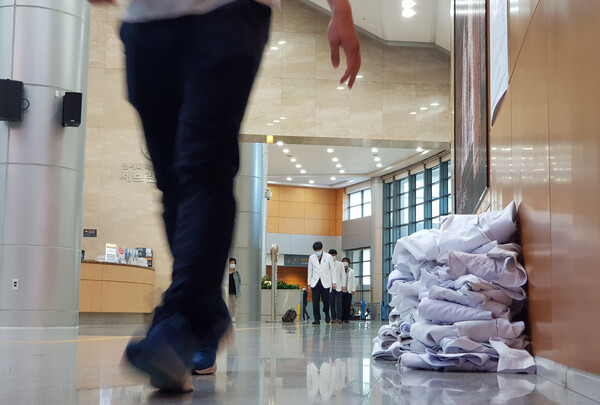Backing away from its hardline stance, the Korean government has expressed its willingness to become more flexible in imposing punitive measures against resigned interns and residents and talk with them.
Still, the conciliatory moves seem to have fallen short of changing the minds of trainee doctors, according to medical sources.

The resigned junior doctors themselves said that little has changed in the government’s basic position. Some even said the government “has lost its credibility."
The government visibly changed its stance after a meeting on Sunday between Han Dong-hoon, temporary chairman of the ruling People Power Party (PPP), and the Medical Professors Association of Korea (MPAK). "I received a request to mediate a constructive dialog between the government and the medical community," Han said.
The presidential office also responded immediately, saying that President Yoon Suk Yeol has instructed Prime Minister Han Duck-soo to devise a plan for flexible handling of the administrative discipline of resigned interns and residents and create a constructive dialogue channel.
In response, the medical professors' group emphasized that the government’s withdrawal of the plan to increase the medical school enrollment quota by 2,000 is a precondition for a dialogue, saying, "If a dialogue is held, trainee doctors and medical students should take the lead."
However, despite the government’s back-off from a hardline stance and its expression of willingness to talk, the junior doctors have shown a cold response.
On Sunday, Park Dan, head of the Korean Intern Resident Association (KIRA) emergency committee, posted a single symbol, “?”, on his social network website.
Ryu Ok Hada, a former intern who resigned from the Catholic University of Korea Daejeon St. Mary's Hospital, said, "It's ridiculous. The MPAK does not represent the opinions of interns and residents, and the government's proposal for dialogue is just a ‘show’ unless it withdraws the scheme for 2,000 additional medical school students.”
The reaction from other trainee doctors was not much different.
"If the government's request for dialogue is sincere, it should be premised on the discussion of expanding medical school students and the essential medical policy package from the ground up," said a trainee who worked at a training hospital in Gyeonggi Province in a phone interview with Korea Biomedical Review. “We cannot trust the government."
The promise of flexibility in administrative penalties sounds like another blackmail, he said, adding that the government has only changed its method.
He said it sounds as if the government won't budge an inch, so get back to work.
Another medical resident who worked at a hospital in the Gyeongsang area said, "As long as the government's stance on increasing the number of medical students by 2,000 is firm, I don't think it will change much even if we talk. I don't see any significant change in the government’s position except for telling 'let's talk about it.'"
Regarding the proposed flexibility in administrative punishment, she said, “It may mean they will punish us ‘later’ instead of now. But they will ‘do’ punish us. It's hard to accept the government’s unwarranted leniency per se because we didn't commit a crime."
Concerning medical professors’ mediation between the government, medical residents, and students, opinions were mixed among trainee doctors. Some said that the government should directly come to the junior doctors, while others acknowledged the need for mediators to end the ongoing turmoil.
"I appreciate that the professors are resigning and mediating," the trainee doctor in Gyeonggi Province said. “However, I don't know if mediation is necessary. The main body of the negotiation should be trainee doctors. The government must persuade senior physicians and junior doctors separately. It makes no sense to tell trainee doctors to return to work because the government has negotiated with medical professors.
The trainee doctor in the Gyeongsang area said, "I think someone should mediate. If the current situation continues, junior doctors could damage the public even if we don't intend to. I think it is necessary to mediate and get the government to act."
They commonly emphasized that a prerequisite for dialogue is discussing the medical student increase and essential care package from the ground up.
"We should discuss the seven demands made by KIRA’s emergency committee,” the Gyeonggi Province trainee doctor said. "I think there is a lot to discuss because both the medical student increase policy and the essential medical care package are unrealistic and inappropriate plans for the future," said Mr. B.
Related articles
- Senior doctors nationwide rush to resign en masse
- Korea to block resigned trainee doctors from getting US medical license
- Medical student increase favors only private university hospitals: opposition lawmaker
- ‘Trainee doctors ineligible to get ILO opinion on plea against government's work order’
- Health Ministry issues public notice mandating return-to-work for 1,308 trainee doctors
- 350 delayed surgeries reported in 1 month after trainee doctors left hospitals
- New leader of doctors' group asks President Yoon to fire health minister
- '2,000 more students will regress medical education by 100 years'
- Appalled by President Yoon's speech, trainee doctors harden resolve to resign
- Hospital crisis deepens as senior doctors' desires to reduce workload clash with financial realities

